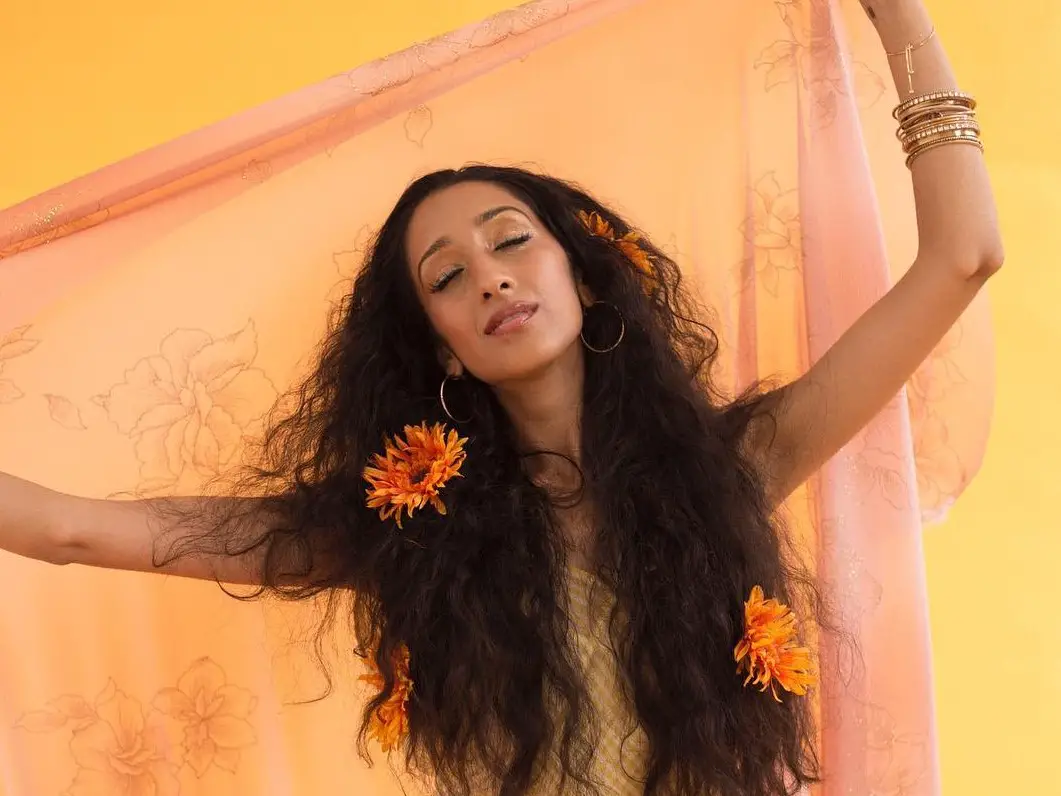South Asian R&B artist Raveena Aurora is stepping into her own power with her new album, “Lucid.” Previously known for tracks like “Honey” and “Temptation,” Aurora’s voice is as delicate and gentle as thread. Her singles thus far have been a place for spiritual healing and meditative thoughts. “Lucid” makes listeners feel like they have been hypnotized into a state of peace. The tone of her singles, paired with the images she provides in her music videos, focuses on femininity and nature and gives insight to her cultural roots.
Aurora is leading the way for young, female, South Asian representation by making her cultural heritage the basis of her music. The track titled “Mama,” featured on “Lucid,” is an insight into the complicated relationship between an immigrant mother and her first generation daughter. The single dropped on Mother’s Day as an ode to immigrant mothers everywhere. Aurora sings, “Looking through your photos, I imagine all of your dreams. I will always wonder who you really were before me. What did you lose? I hope, nothing too soon.”
Aurora reflects on and honors all the sacrifices her mother made for her — she contemplates how many pieces her mother had to shed of herself for her mere existence. She also brings awareness to the repressive part of Indian culture, which uplifts male domination and doesn’t allow females to be embraced, respected or sexually liberated. On “Mama,” she sings, “What kind of tears did you cry on your wedding day? Mama, who were you before your man? Know you had some of those bigger plans.”
She alludes to the concept of arranged marriages and the erasure that can take place in South Asian culture once a woman is married off. Aurora did an interview with Gal Dem magazine, in which she discusses her personal struggles with embracing her womanhood and sexuality within South Asian culture.
“Growing up with South Asian immigrant parents like my own, it was rare for women’s sexuality or desire to be talked about,” Aurora shared. “That can lead to feelings of repression, and a struggle to find power in asking for what you want. I didn’t have that much self-worth because South Asian culture is so based in the patriarchy and has so many subliminal messages about how women are less than men — that women are meant to serve men and are inferior. At the same time, in Western media, I didn’t see anyone of my color or heritage, which didn’t help. The combination of that was hard to overcome.”
Aurora proves on “Lucid” that she has conquered her battles with self-acceptance of owning her sexuality and femininity. On the track “Stronger,” Aurora sings, “Holy as the sunrise, clear as the water. I was naive to think a man could be stronger than me. I know you love to see me broken. You live to see me confused at my knees.”
Aurora reveals that her heritage has taught her to be submissive to men and bow down at their feet, yet she stands tall. Throughout the song, it seems like she is flying with feminine power and energy. Many Tracks on “Lucid” suggest that Aurora has been re-birthed and spiritually awakened.
On the track “Petal,” her voice is breathy and angelic as she sings “When I feel like a petal floating in the breeze. When I feel like a speck inside an endless feed. I am weightless.” The sound of her vocals and the lyrics she uses give fans an image of Aurora being cleansed of all negative emotions — a surrendering to what’s to come.
Aurora embraces the strength that can be found within her cultural roots as the foundation for “Lucid.” In her music videos she pairs her soft, delicate vocals with lively and striking colors that fill the screen. Aurora flaunts her heritage proudly by wearing a bindi and flaunting saris wrapped around her body like gold. She gives the world access to underrepresented voices and raises awareness about the undiscovered beauty that lies within South Asian culture.
In an interview with Gal-Dem Magazine, Aurora revealed that Bollywood has had a massive impact on her music: “Bollywood movies are made for dreamers and escapists. Watching them as a kid was definitely a form of escapism for me and empowering because I was seeing stories with people who looked like me on screen. The wildly colorful and larger than life, romantic essence of Bollywood movies has always been a source of inspiration to me.”
“Lucid” explores sexuality and womanhood through a lens of Indian culture, where expressing those types of themes takes unwavering resilience and confidence. Tracks like “Nectar” and “Still Dreaming” elicit sensuality. On “Nectar,” Aurora sings, “Stretch marks on my thighs. Skin shades of earth. Knots in my hair, it’s real. Don’t fear it. Come stay a while. You’ve been missing my sunflowers, sun showers.”
These lyrics reflect body positivity and ownership over one’s own body. However, in the same interview, Aurora alludes to the battle of attaining self-love that many young women of color go through: “Initially I viewed myself as an object and as an exotic ‘thing’ and it took me a long time to get to a place where that kind of sensuality was for myself. I couldn’t approach my sexuality or sensuality in that way for so long because I didn’t have as much self-worth.”
“Lucid” showcases the strength that lies in understanding and embracing your identity, cultural roots and womanhood. Aurora has transformed “Lucid” into a space for healing, connectedness and spiritual growth. She uses her gentle and soft vocals as her armor, and sheds stereotypes as if it’s old skin.
Aurora leads an army of young brown women everywhere who have been uplifted and supported by finally seeing a piece of themselves reflected in the media. She is not afraid of her differences, and she recognizes that her many layers make her who she is.
“Lucid” is a culmination of Aurora’s identity aligning and coming together like a puzzle. She speaks on her desire to express that there is strength in being gentle: “And I’m soft, yes, I’m vulnerable and sweet, but I handle a lot at the same time — that duality is okay. Women are allowed to be multifaceted.”
















